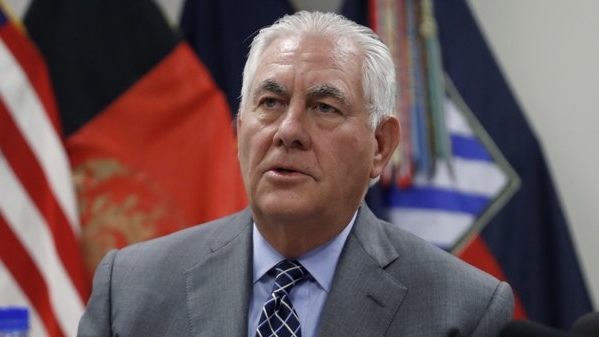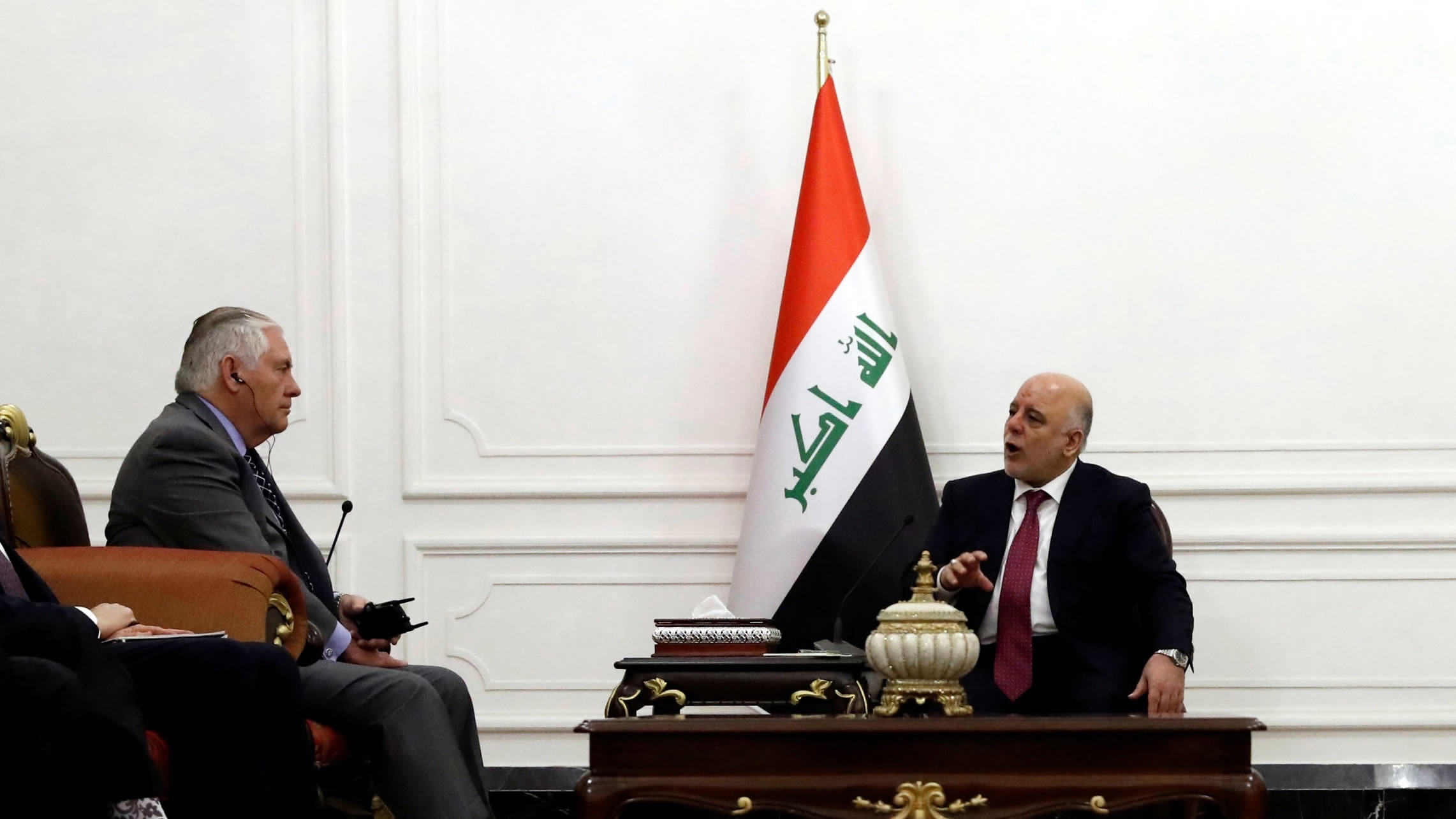US Secretary of State Rex Tillerson made an unannounced visit to Iraq a day before heading off to his scheduled trip to Pakistan on Tuesday, where he is expected to push Islamabad toward taking action against militants targeting Afghanistan from its soil.
Earlier on Monday, Tillerson also made a surprise visit to Afghanistan, following visits to Saudi Arabia and Qatar.
Tillerson’s Pakistan visit comes at a time when Islamabad is wary of Washington’s deepening ties with arch-rival India. Islamabad views its much-bigger neighbor as an existential threat and the two nuclear armed nations have fought three wars since their violent partition at the end of the colonial rule in 1947.
Islamabad wary of US-India ties
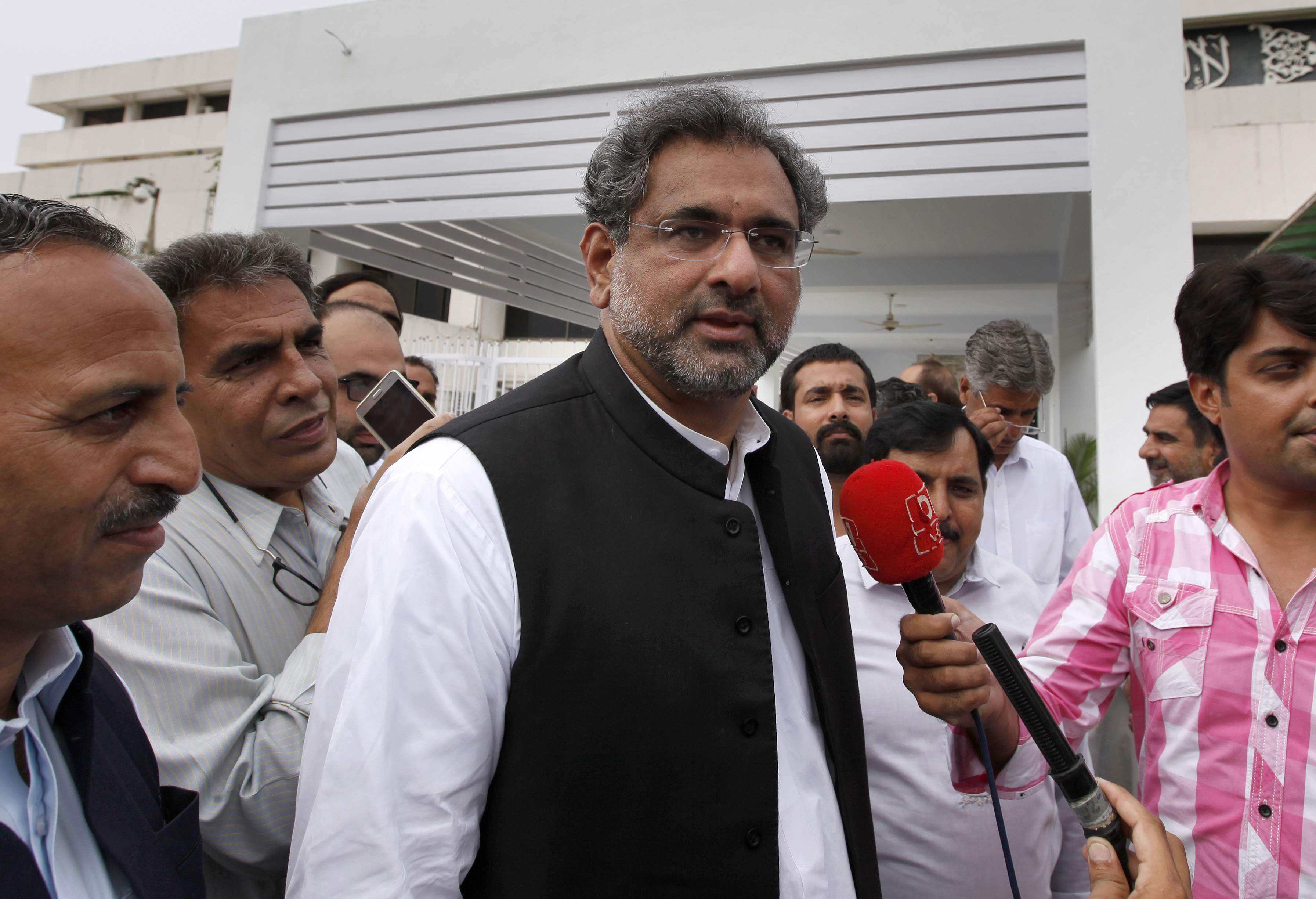
A file photo of Pakistani Prime Minister Shahid Khaqan Abbasi. US Secretary of State Rex Tillerson is due to meet with Abbasi in Islamabad on October 24, 2017. /AP Photo
A file photo of Pakistani Prime Minister Shahid Khaqan Abbasi. US Secretary of State Rex Tillerson is due to meet with Abbasi in Islamabad on October 24, 2017. /AP Photo
Pakistan, a staunch US Cold War ally and a key player in the US-backed invasion of Afghanistan following the September 11, 2001 terror attacks in the US, has watched warily as Washington has in recent years pivoted towards New Delhi.
Tillerson, due to meet Pakistan’s Prime Minister Shahid Khaqan Abbasi and its powerful military chiefs in a one-day visit, is expected to urge Islamabad to do more to root out Afghan Taliban and Haqqani network militants operating on its oil.
But he is also expected to hear Pakistani officials warn him that drawing nuclear armed India deeper into Afghanistan would destabilize the region and do little to end the 16-year war that is now America’s longest military conflict.
"Bringing India into the mix is like adding kerosene to fire," Miftah Ismail, a state minister and close ally of Prime Minister Abbasi, told Reuters. "It’s a complete red line. India has no political role to play in Afghanistan as far as we are concerned," he added.
Many Pakistanis feel betrayed that its traditional ally is now cosying up to India over Afghanistan.
But the anger runs both ways.
The United States accuses Pakistan of playing a double game since 2001, offering public backing to Washington while turning a blind eye - or, even at times, assisting - the Afghan Taliban and other militants who carry out deadly attacks against US forces and their allies in Afghanistan.
Pakistan supported the Afghan Taliban in the 1990s as a hedge to Indian influence in Afghanistan, and analysts say its military and security services maintained ties long after the Taliban regime was toppled in 2001.
Pakistan denies providing a safe haven for Afghan Taliban and other militant fighters.
Room for Taliban in government: US
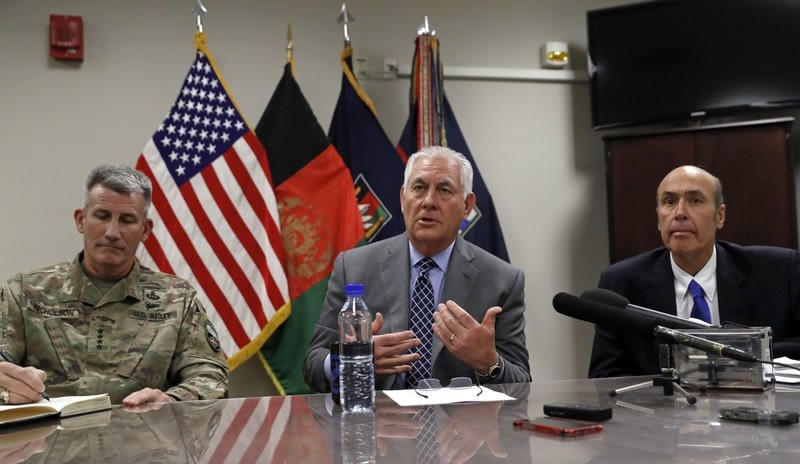
US Secretary of State Rex Tillerson (Center) with Gen. John Nicholson (left), commander of Resolute Support, and Special Charge d’Affaires of the US Embassy in Kabul Hugo Llorens, at Bagram Air Field, Afghanistan, on October 23, 2017. /AP Photo
US Secretary of State Rex Tillerson (Center) with Gen. John Nicholson (left), commander of Resolute Support, and Special Charge d’Affaires of the US Embassy in Kabul Hugo Llorens, at Bagram Air Field, Afghanistan, on October 23, 2017. /AP Photo
During his surprise visit on Monday to Afghanistan, where he met President Ashraf Ghani, Chief Executive Abdullah Abdullah and other senior officials at Bagram Air Base north of Kabul, Tillerson said the Taliban must understand that they will never win a military victory and should prepare to negotiate with the government.
"Clearly, we have to continue to fight against the Taliban, against others, in order for them to understand they will never win a military victory," AP quoted Tillerson as telling the accompanying reporters.
"And there are, we believe, moderate voices among the Taliban, voices that do not want to continue to fight forever. They don’t want their children to fight forever. So we are looking to engage with those voices and have them engage in a reconciliation process leading to a peace process and their full involvement and participation in the government," he added.
"There’s a place for them in the government if they are ready to come, renouncing terrorism, renouncing violence and being committed to a stable prosperous Afghanistan," Tillerson said.
Tillerson outlined to Ghani and Abdullah the Trump administration’s new South Asia policy, which the president rolled out last month and views the region through a lens that includes Afghanistan as well as Pakistan and India. The approach is heavy on combating and beating extremist groups in all three countries.
"We also want to work with regional partners to ensure that there are no threats in the region," he said. "This is very much a regional effort as you saw. It was rolled out in the strategy itself, demanding that others deny safe haven to terrorists anywhere in the region. We are working closely with Pakistan as well."
The US Secretary of State said Washington has made some "very specific requests of Pakistan in order for them to take action to undermine the support the Taliban receives and other terrorist organizations receive".
Delicate balance of power
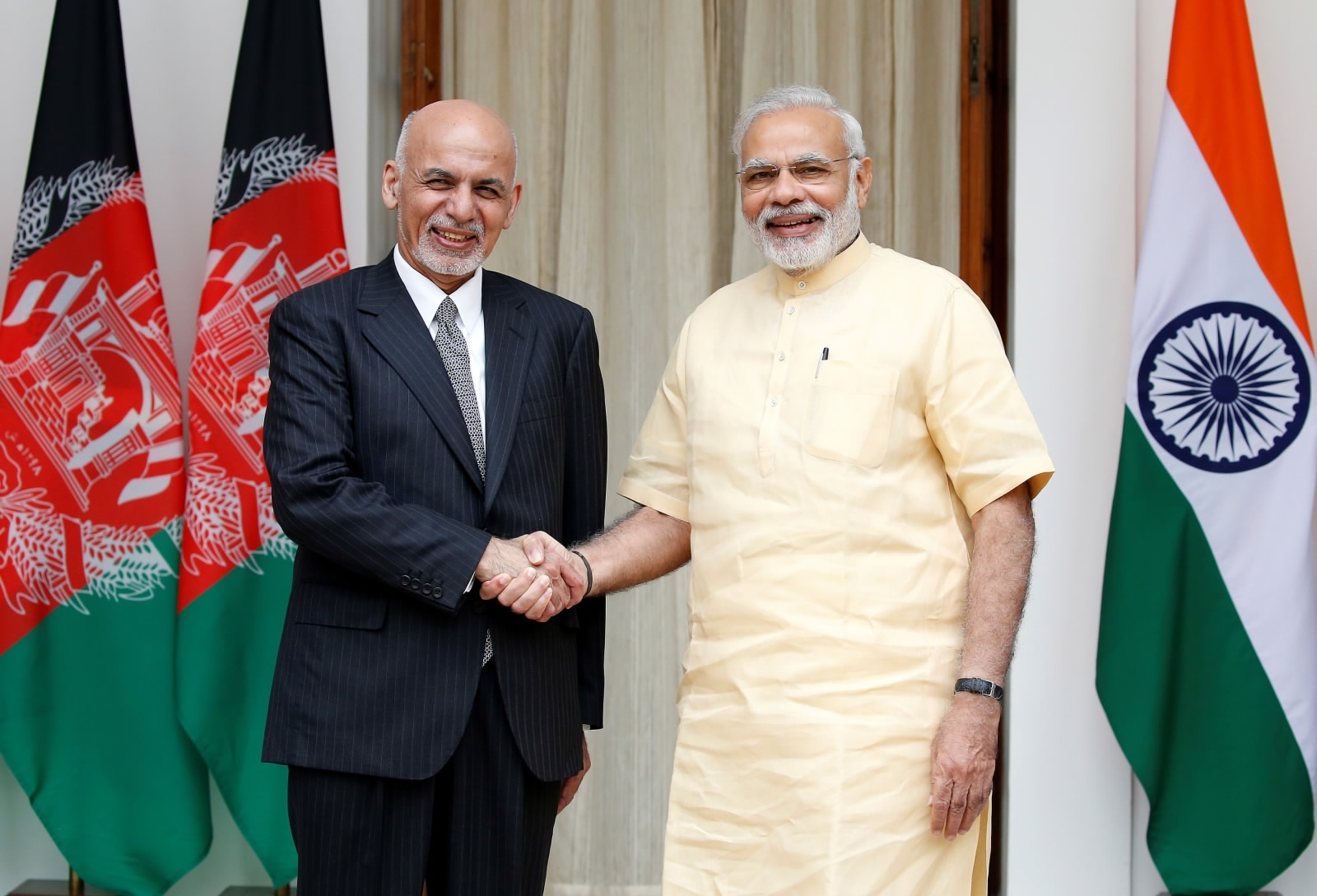
Afghan President Ashraf Ghani (left) and India’s Prime Minister Narendra Modi during their meeting in New Delhi, India, on September 14, 2016. /Reuters Photo
Afghan President Ashraf Ghani (left) and India’s Prime Minister Narendra Modi during their meeting in New Delhi, India, on September 14, 2016. /Reuters Photo
US Defense Secretary Jim Mattis earlier this month said the US would try "one more time" to work with Pakistan in Afghanistan, before opting for more punitive measures. President Donald Trump has vowed to be tougher on Pakistan than his predecessors.
The United States has threatened further military aid cuts and US officials have mooted targeted sanctions against Pakistani military figures, but in the past two weeks there have been hints of a slight thawing in ties.
US Vice President Mike Pence and Tillerson last week called Abbasi to thank Pakistan after its army rescued a US-Canadian couple who were held hostage by the Taliban-allied Haqqani network for nearly five years, along with their three children born in captivity.
Relations were further boosted when Omar Khalid Khorasani, leader of the lethal Jamaat-ul-Ahrar (JuA) group who Islamabad had been trying to catch for years, was killed by a US drone strike last week.
India has increased aid to Afghanistan in recent years and last year promised to ship more arms. Such moves have aggravated fears in Pakistan that it will find itself wedged between two hostile neighbors. Islamabad bristles at the idea that India holds the key to ending the Afghanistan conflict, and fears US meddling could unsettle a delicate balance of power in South Asia.
"Promoting a higher involvement of India in Afghanistan will only worsen the historic strategic rivalries playing out in the region," said Sherry Rehman, Pakistan’s former ambassador to United States and a senior member of the opposition Pakistan People’s Party.
But while Pakistan may not like it, India looks set to continue playing a role in Afghanistan, according to Sushant Sareen, a foreign policy analyst at the Vivekananda International Foundation, a think-tank with ties to the government of Indian Prime Minister Narendra Modi.
"The message is very clear that India is an important player when it comes to coordinating policies between Afghanistan and Washington," Reuters quoted Sareen as saying.
Tillerson will visit New Delhi on Wednesday.
Iraq slams remark on Iran militia
Meanwhile, Iraq’s Prime Minister Haider al Abadi met Tillerson in Baghdad on Monday, challenging the US Secretary of State over his comments on Iranian militias in Iraq.
Tillerson, in Riyadh on Sunday, had called on Iranian militias in Iraq to "go home" as the fight against the Islamic State group was ending.
His comments prompted a sharp response from Baghdad.
"The fighters of the Hashed al-Shaabi are Iraqis who have fought terrorism, defended their country and made sacrifices to defeat [ISIL]," Abadi said, according to a statement from his office. The 60,000-strong Hashed was formed in 2014 after ISIL seized swathes of northern Iraq, routing government forces. "The Hashed is an institution that depends on the Iraqi state and the constitution does not allow the presence of armed groups outside the law," Abadi said.
Abadi and Tillerson both attended a landmark meeting between Saudi and Iraqi leaders in Riyadh on Sunday aimed at upgrading strategic ties between the two countries and countering Iran's regional influence.
Tillerson and Abadi, in Baghdad, discussed "government measures taken to restore the authority of the federal government in Kirkuk," Abadi's spokesman Haydar Hamada said.
(With input from agencies)

